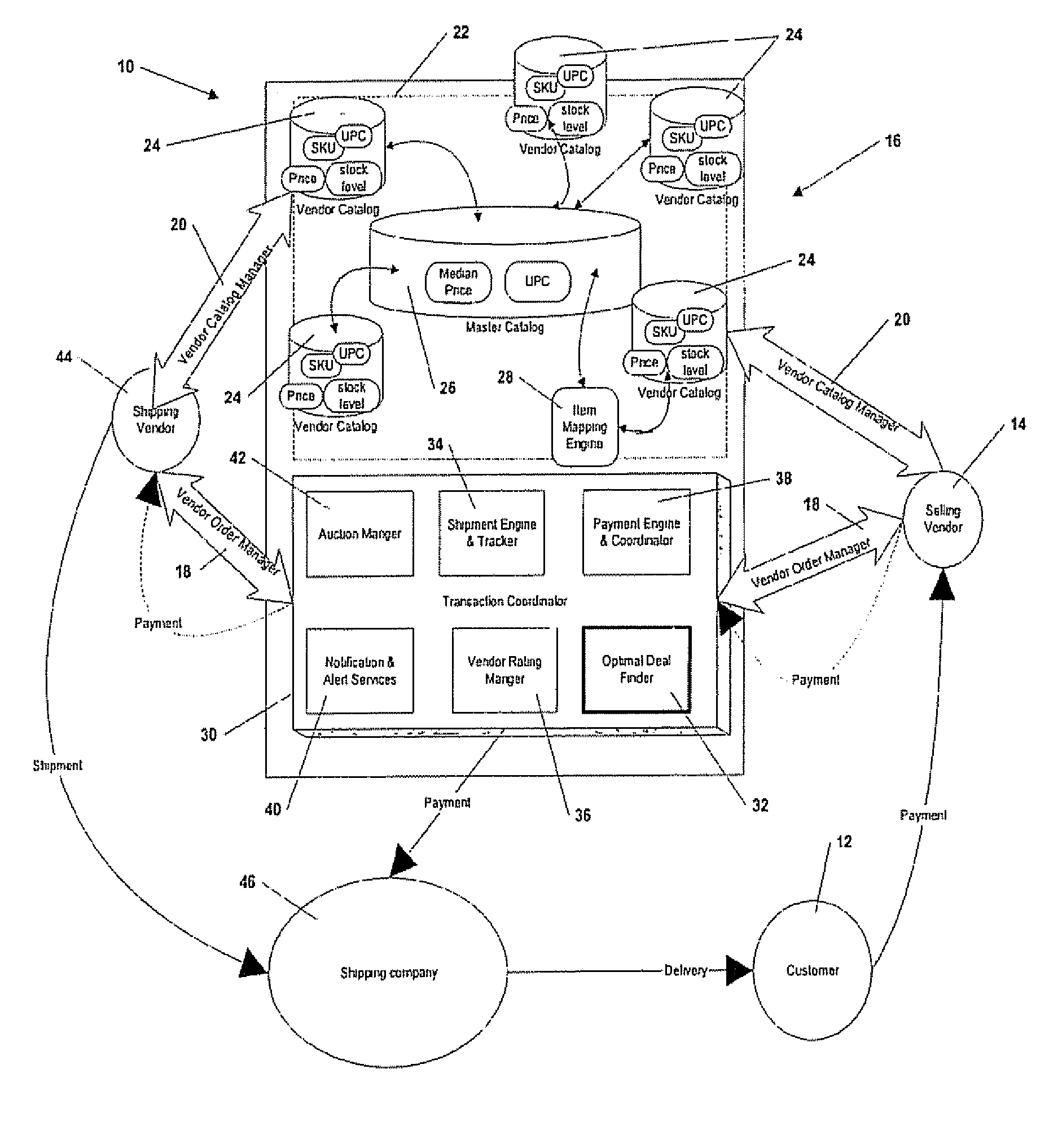Automated Transaction Coordinator
a technology of automatic coordination and transaction coordinator, applied in the direction of data processing applications, buying/selling/lease transactions, instruments, etc., can solve the problems of variable expenses of vendors, and achieve the effects of reducing unnecessary costs, optimizing various aspects, and extending the market outreach of its members
- Summary
- Abstract
- Description
- Claims
- Application Information
AI Technical Summary
Benefits of technology
Problems solved by technology
Method used
Image
Examples
example 1
Reduction of Transaction Cost Where Products are Similarly Priced
[0075] This example focuses on optimizing a transaction when the prices of the item involved in the transaction are similar for all vendors in the system. In this situation, the emphasis is placed on identifying a shipping vendor that is geographically closer to the customer than the selling vendor so that shipping costs are reduced. This scenario is most likely to occur if the consumer wants the item delivered overnight and / or the weight of the item is relatively large
[0076] 1. Selling vendor (vendor 1) is located in California (CA); customer is located in Connecticut (CT).
[0077] 2. Customer places an order with the selling vendor for an item that costs $100. The customer chooses to have the item delivered via overnight (air) shipping from CA to CT at a cost of $30. The total cost of the order is $100+$30=$130.
[0078] 3. Selling vendor collects $130 from the customer.
[0079] 4. Selling vendor places order with the ...
example 2
Different Product Pricing
[0088] In this scenario, the emphasis is not set on the difference in shipping cost from one vendor to the customer versus the second vendor to the customer, but rather on the difference in the two vendors' pricing concerning a particular product.
[0089] 1. Selling vendor (vendor 1) is located in New York (NY); customer is located in Connecticut (CT).
[0090] 2. Customer places an order with the selling vendor for an item that costs $100. The customer chooses to have the item delivered via ground shipping from New York (NY) to CT at a cost of $5. The total cost of the order is $100+$5=$105.
[0091] 3. Selling vendor collects $105 from the customer.
[0092] 4. Selling vendor places order with the Hub.
[0093] 5. Hub identifies a suitable shipping vendor (vendor 2) in California (CA). Vendor 2 is a wholesaler, and has lower pricing for this item. Instead of the $100 vendor 1 is regularly charging, vendor 2 only charges $90. This lower pricing may also be the resu...
example 3
Different Product Pricing and Lower Shipping Costs
[0100] This scenario is similar to Examples 1 and 2 and progresses in a similar fashion. However, in this case the hub looks for potential shipping vendors that have both lower pricing and a favorable location, leading to a maximization of savings realized through the transaction. In Example 1, the savings were $25 due to reduced shipping costs. In Example 2, the savings were $10 due to lower pricing. In a favorable situation, the Hub may identify a combination of the two factors that leads to total savings of $35, which could be distributed in various ways among the three parties involved in the transaction.
PUM
 Login to View More
Login to View More Abstract
Description
Claims
Application Information
 Login to View More
Login to View More - Generate Ideas
- Intellectual Property
- Life Sciences
- Materials
- Tech Scout
- Unparalleled Data Quality
- Higher Quality Content
- 60% Fewer Hallucinations
Browse by: Latest US Patents, China's latest patents, Technical Efficacy Thesaurus, Application Domain, Technology Topic, Popular Technical Reports.
© 2025 PatSnap. All rights reserved.Legal|Privacy policy|Modern Slavery Act Transparency Statement|Sitemap|About US| Contact US: help@patsnap.com



